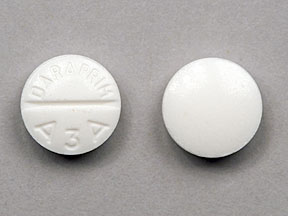Daraprim
Generic name: pyrimethamine [ PIR-i-METH-a-meen ]
Drug class: Miscellaneous antimalarials
What is Daraprim?
Daraprim is an antiparasite medicine that helps prevent parasites from growing and reproducing in the body.
Daraprim is used in adults and children to treat or prevent certain types of malaria. However, this medicine is generally not preferred as a medicine to prevent malaria while traveling. When used to treat malaria, this medicine should be used together with a faster-acting anti-malaria medicine such as chloroquine or quinine.
Daraprim is also used to treat toxoplasmosis, an infection caused by the Toxoplasma parasite.
Daraprim may also be used for purposes not listed in this medication guide.
Daraprim side effects
Get emergency medical help if you have signs of an allergic reaction: hives; difficult breathing; swelling of your face, lips, tongue, or throat.
Daraprim may cause serious side effects. Stop using Daraprim and call your doctor at once if you have:
-
sore throat, swelling in your tongue;
-
pale skin, easy bruising, purple spots under your skin;
-
the first sign of any skin rash, no matter how mild;
-
blood in your urine;
-
fever, cold or flu symptoms;
-
new or worsening cough, fever, trouble breathing;
-
irregular heartbeats;
-
signs of folate deficiency--unusual tiredness, mood changes, feeling sick, mouth sores, stomach discomfort, loss of appetite;
-
severe skin reaction--fever, sore throat, swelling in your face or tongue, burning in your eyes, skin pain, followed by a red or purple skin rash that spreads (especially in the face or upper body) and causes blistering and peeling.
Common side effects of Daraprim may include:
-
vomiting; or
-
loss of appetite.
This is not a complete list of side effects and others may occur. Call your doctor for medical advice about side effects. You may report side effects to FDA at 1-800-FDA-1088.
Related/similar drugs
Warnings
You should not use Daraprim if you have a blood cell disorder called megaloblastic anemia that has been caused by folate deficiency.
Before taking this medicine
You should not use Daraprim if you are allergic to it, or if you have:
-
a blood cell disorder called megaloblastic anemia that has been caused by folate (folic acid) deficiency.
To make sure Daraprim is safe for you, tell your doctor if you have ever had:
-
kidney disease;
-
alcoholism; or
-
if you are malnourished.
Using Daraprim during pregnancy could harm the unborn baby. Use effective birth control to prevent pregnancy while taking Daraprim, and tell your doctor if you become pregnant.
In some cases, Daraprim is given to pregnant women to treat toxoplasmosis. Talk with your doctor about the risks and benefits of using this medicine if you are pregnant.
Pyrimethamine can pass into breast milk and may cause side effects in the nursing baby. Tell your doctor if you are breast-feeding.
How should I take Daraprim?
Follow all directions on your prescription label. Your doctor may occasionally change your dose. Do not take this medicine in larger or smaller amounts or for longer than recommended.
Your dosage and the length of time you take Daraprim will depend on the reason you are taking this medicine. In some cases this medicine is taken for several weeks, and you may need to take the medicine only once per week.
The Daraprim dose for treating toxoplasmosis is much higher than the dose for malaria.
Follow your doctor's dosing instructions very carefully.
Your dose may need to be cut in half after you have been taking Daraprim for 1 to 3 weeks (after 2 to 4 days for a child).
Take with food if Daraprim upsets your stomach or affects your appetite.
Daraprim is often given in combination with other medications. Use all medications as directed by your doctor. Read the medication guide or patient instructions provided with each medication. Do not change your doses or medication schedule without your doctor's advice.
While using Daraprim, you may need frequent blood tests.
Store at room temperature away from moisture, heat, and light.
What happens if I miss a dose?
Take the missed dose as soon as you remember. Skip the missed dose if it is almost time for your next scheduled dose. Do not take extra medicine to make up the missed dose.
What happens if I overdose?
Seek emergency medical attention or call the Poison Help line at 1-800-222-1222. An overdose of Daraprim can be fatal, especially to a child.
Overdose symptoms may include stomach pain, severe vomiting, coughing up blood or vomit that looks like coffee grounds, feeling anxious or excited, seizure (convulsions), and weak or shallow breathing (breathing may stop).
What should I avoid while taking pyrimethamine?
Follow your doctor's instructions about any restrictions on food, beverages, or activity.
What other drugs will affect Daraprim?
Tell your doctor about all your current medicines and any you start or stop using, especially:
-
phenytoin; or
-
a sulfa drug.
This list is not complete. Other drugs may interact with pyrimethamine, including prescription and over-the-counter medicines, vitamins, and herbal products. Not all possible interactions are listed in this medication guide.
More about Daraprim (pyrimethamine)
- Check interactions
- Compare alternatives
- Pricing & coupons
- Reviews (1)
- Drug images
- Side effects
- Dosage information
- During pregnancy
- Generic availability
- Drug class: miscellaneous antimalarials
- Breastfeeding
- En español
Patient resources
Professional resources
Related treatment guides
Further information
Remember, keep this and all other medicines out of the reach of children, never share your medicines with others, and use this medication only for the indication prescribed.
Always consult your healthcare provider to ensure the information displayed on this page applies to your personal circumstances.
Copyright 1996-2025 Cerner Multum, Inc. Version: 6.02.

